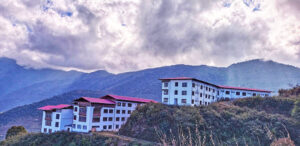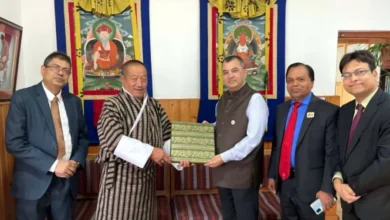Bhutan PM calls for joint efforts to address substance abuse in schools

By Thinley Namgay
Prime Minister Tshering Tobgay urged Bhutanese to collaborate in combating drug abuse in schools, at the press meeting yesterday, while responding to concerns of the so-called specialised school in Yonphula, Trashigang, for students who are struggling with substance abuse.
After the government announced to make Yonphula a specialised school for students struggling with substance use-related issues, concerns were raised if the government consulted parents and students, with some voicing concerns that it would do more harm – leading to discrimination, for instance, to students of the specialised school.
The Prime Minister said that there are problems with drugs in the country and everyone should accept this truth and support each other to solve it. To solve the issue, the Prime Minister said the government would leave no stone unturned to fulfill the mission of the specialised school at Yonphula, which is to support and treat students struggling with substance use-related issues.
The Prime Minister said that students opt for drugs due to personal issues or peer pressure, but it affects their brain and spirit, and there is a risk of many students getting involved in such unhealthy acts.
“Specialised schools will treat our students instead of sending them to prison. Parents should support and accept the reality,” the Lyonchhen said, adding that parents should question who is failing when their child gets into drugs. “Is it the fault of the government, students, parents, schools, or police?”
The Prime Minister said that parents should discipline their children. Some parents are not bothered even if they know that their children are into drugs.
“Parents should not forget their responsibility. Our youth is the future of Bhutan and we can’t compromise the future.”
Services of the specialised school and commencement
Education Minister Yeezang De Thapa said the school would focus on both regular classes and treatment, blending education, therapy, and support services.
There will be individual and group therapy sessions, medical care, psychiatric evaluations, and vocational training, among others.
“Students will be getting more personalised attention and comprehensive care,” Lyonpo Yeezang De Thapa said, adding that many countries have established such schools successfully. “Students will be facilitated by expert teachers, counselors, and therapists.”
The minister also said the government intends to prepare students for academic success, making them stable and substance-free when they conclude their rehab period. “It is a significant step in safeguarding the future of the youth and the nation at large.”
Clarifying concerns, the minister said that students will be in the school only for the duration of their treatment and then reintegrated back into their original school.
Meanwhile, the school will not be able to start by July this year as initially announced. The education minister said the government had to postpone it to early next year due to various factors. During a recent visit by the minister to the new school campus, it was observed that much work remains to be done.
There is a need for retaining walls below the hostels, fencing around the campus, repair of buildings, good bathroom facilities and kitchens, and heating and cooling systems in the rooms.
Public concerns
While there are mixed public reactions regarding the establishment of a specialised school at Yonphula, some parents believe that segregating and isolating students grappling with substance abuse from their parents or loved ones might affect their well-being and successful social reintegration later.
Chithuen Phendhey Association’s Executive Director and parent, Tshewang Tenzin, said that this decision by the government violates many human rights aspects of children. “Substance abuse is not a behavioral issue. It is a psychological issue and a disease.”
“Even before the establishment of this specialised school, it attracted long-term stigma and discrimination for some students,” he said, adding that it labels and isolates them from the community.
As most students will be under the age of 18, parents call for due procedures with proper consultations and their consent. Parents said that no public consultations were held so far on this school. Some parents questioned how the government would actually identify regular drug users in schools.
“For instance, some students consume drugs once out of curiosity. If they are caught by the government at the time of screening and sent to the specialised school, does this really serve the purpose, “ a parent said.
Parents suggested that the government consider due process, child rights acts, and future consequences.
A former drug user said, “Once you are in rehab, people label you throughout your life, saying that you went to rehab for abusing drugs. I still feel that stigma. This is the main challenge for any drug user once they are out of rehab.”
Some people said that if the government holds public consultations regarding this school, it will not become like the existing narcotic act, which did more harm to the youth as many productive youths are behind bars.
Meanwhile, the Narcotic Drugs, Psychotropic Substances and Substance Abuse (NDPSSA) Act of 2015 emphasises treating substance abuse as a health issue requiring treatment, rehabilitation, and social reintegration through counselling, life skills education, and providing healthy recreational opportunities.
Section 32 of the NDPSSA Act mandates the government ensure youth are comprehensively informed and educated on the dangers of substance abuse and provided with preventive support and protection through the empowering networks of families, educational institutions, local communities, and religious institutions.
Sections 20 to 23 of the Childcare and Protection Act (CCPA), 2011 uphold crucial principles of decriminalisation, protecting child dignity and privacy rights, avoiding unnecessary separation from parents, and restricting the use of force or restraints only as an absolute last resort.
The Constitution prohibits any form of discrimination on the grounds of race, sex, language, religion, politics, or other status. A major concern among many was segregating a group of students based on substance abuse could be viewed by some as discrimination.




